- Home
- Rabindranath Tagore
Selected Poems (Tagore, Rabindranath) Page 11
Selected Poems (Tagore, Rabindranath) Read online
Page 11
That even today your heart wards off
100
The ever-falling darkness
Of history?
That even today it has not escaped by the liberating path
Of forgetfulness?
Tombs remain forever with the dust of this earth:
105
It is death
That they carefully preserve in a casing of memory.
But who can hold life?
The stars claim it: they call it to the sky,
Invite it to new worlds, to the light
110
Of new dawns.
It breaks
The knot of memory and runs
Free along universal tracks.
Emperor, no earthly empire could ever keep you:
115
Not even the whole
Ocean-resounding natural world could supply you.
And so
When your life’s commedia was complete
You kicked this world away
120
Like a used clay vessel.
You are greater than your fame: more and more of it is thrown
From your soul’s chariot
As it journeys on:
Your relics lie here, but you are gone.
125
The love that could not move or carry forward,
The love that blocked its own road
With its own grand throne
Could adhere to you no more than the dust of a road on your feet
For all its intimate sweetness –
130
And thus
You returned it to the dust behind you,
And griefs seed,
Blown by your heart’s feeling,
Was shed from the garland of your life.
135
You travelled on afar:
The deathless plant that grew
From that seed to meet the sky
Speaks to us now with sombre melody -
‘Stare no matter how distantly,
140
That traveller is no longer here, no longer here.
His beloved kept him not,
His realms released him,
Neither sea nor mountain could bar him.
Today his chariot
145
Travels at the beck of the night
To the song of the stars
Towards the gate of dawn.
I remain here weighted with memory:
He is free of burdens; he is no longer here.’
Gift
O my love, what gift of mine
Shall I give you this dawn?
A morning song?
But morning does not last long –
5
The heat of the sun
Wilts it like a flower
And songs that tire
Are done.
O friend, when you come to my gate
10
At dusk
What is it you ask?
What shall I bring you?
A light?
A lamp from a secret corner of my silent house?
15
But will you want to take it with you
Down the crowded street?
Alas,
The wind will blow it out.
Whatever gifts are in my power to give you,
20
Be they flowers,
Be they gems for your neck,
How can they please you
If in time they must surely wither,
Crack,
25
Lose lustre?
All that my hands can place in yours
Will slip through your fingers
And fall forgotten to the dust
To turn into dust.
30
Rather,
When you have leisure,
Wander idly through my garden in spring
And let an unknown, hidden flower’s scent startle you
Into sudden wondering –
35
Let that displaced moment
Be my gift.
Or if, as you peer your way down a shady avenue,
Suddenly, spilled
From the thick gathered tresses of evening
40
A single shivering fleck of sunset-light stops you,
Turns your daydreams to gold,
Let that light be an innocent
Gift.
Truest treasure is fleeting;
45
It sparkles for a moment, then goes.
It does not tell its name; its tune
Stops us in our tracks, its dance disappears
At the toss of an anklet.
I know no way to it –
50
No hand, nor word can reach it.
Friend whatever you take of it
On your own,
Without asking, without knowing, let that
Be yours.
55
Anything I can give you is trifling –
Be it a flower, or a song.
Deception
Binu was twenty-three when illness struck her.
Doctors and drugs
Became a greater torment than the illness itself;
Different-labelled bottles, different-shaped pill-boxes piled up.
5
After a year and a half of treatment her bones stuck out:
Then they said, ‘Give her a change of air.’
So it was that Binu took her first train-journey,
Left her parents-in-law’s house for the first time since marriage.
The restrictions, the airless sequestration of the joint family
10
Had forced so broken a rhythm on our life together:
Our meetings furtive,
Our days a patchwork of snatched words and abortive smiles.
Today suddenly Earth seemed to be raising the whole light of the sky
To welcome us afresh as man and wife;
15
The expression in Binu’s illness-enlarged eyes
Was like a bride’s first unveiled look again, in a new world.
When beggars along the railway-track
Wailed at us for alms,
Binu would dig into her box for coins
20
Wrap them in paper,
Fling them freely.
How could her happiness bear its own weight
But by making everyone happy?
It was as if we had left behind our broken domestic moorings
25
To sail away down a river of permanent love:
Binu’s mood and charity
Could not but fill the journey with universal grace.
The thought seemed to burst again and again in her mind:
‘Today my husband cares only for me;
30
There is no one else anywhere,
No husband’s relatives before, behind or around me –’
The relief of it thrilled her bodily.
At Bilāspur station we had to change trains;
We got down hurriedly.
35
Six hours to fill in the waiting-room:
They seemed an age to me,
But Binu said, ‘Why? It’s good to wait.’
There seemed no limit to her delight.
The journey was a flute that made her want to dance:
40
Waiting, moving were made one by her happiness.
She opened the door of the waiting-room and said,
‘Look, look at those horse-carts passing –
And can you see? That calf over there, how shiny and plump it is,
What deep love in its mother’s eyes!
45
And next to that steep-sided pond over there,
That little fenced-in house under śiśu-trees,
Near the railway-line,
Is it the station-master’s? What a lovely place to live.’
I s
pread out a bed-roll in the waiting-room.
50
‘Binu,’ I said, ‘have a rest now. Lie down and sleep.’
I pulled a chair on to the platform
And began to read an English novel I had bought.
Goods trains passed; passenger trains –
About three hours went by.
55
Suddenly I heard Binu call from just inside the waiting-room,
‘Can you come? I want to tell you something.’
There was a Hindusthānī woman inside the room:
She looked me in the eyes,
Bowed, withdrew to the platform where she stood clutching a pillar.
60
Binu said, ‘She’s called Rukminī.
She lives in that row of huts by the well over there;
Her husband is a station coolie.
Some years ago
There was trouble where they lived:
65
The zamindār was a tyrant – they had to flee.
They used to have seven bighās of land, I forget the name of their village,
It was by a river somewhere – ’
I interrupted her, said with a smile,
‘The train will be here before you’ve finished Rukminī’s life-story.
70
Come on, it won’t hurt to cut it short.’
‘Yes it will,’ said Binu angrily, glaring, frowning –
‘Why should I cut it short?
You’re not hurrying to get to the office – what’s the fuss?
You can listen to it right through.’
75
So much for my English novel. Instead I listened in full
To the lengthy story of a railway coolie.
The nub was at the end, an expensive one:
The coolie’s daughter was being married; they needed
Bracelets, bangles, armlets for the dowry.
80
They’d cut it right down, but they’d have to spend twenty-five rupees.
It was such a worry:
Rukminī was terribly cast down by it.
Could I not,
Just this once,
85
Relieve Rukminī of the worry?
Before we got on the train, I must give her
The whole twenty-five rupees.
What an absurd business!
Whoever heard of such a thing?
90
The woman was probably a sweeper or something equally disgusting,
Cleaning out the waiting-room daily –
To think of giving twenty-five rupees to her!
I’d quickly go bankrupt if I gave away money like that.
‘All right, I understand,’ I said. ‘But I find
95
I only have a hundred-rupee note –
No way of changing it.’
‘They’ll change it for you at the ticket-office,’ said Binu.
I answered, ‘All right, I’ll see what I can do.’
I called the woman, took her aside,
100
And then I tore into her:
‘I’ll make sure you lose your job!
Going around duping passengers? I’ll soon put a stop to it.’
When she burst into tears and clung to my feet
I gave her two rupees and had done with her.
105
The temple-light went dark, went out.
At the end of two months I was on my way home.
When I got down once again at Bilāspur to change trains,
I was alone.
In her final moments Binu had taken the dust of my feet and said,
110
‘Whatever else in my life I shall forget,
These last two months will be marked on my brow forever –
Like the everlasting vermilion in the parting of Laksmī’s hair.
These two months have filled my soul with nectar:
That is what I remember as I bid you farewell.’
115
O all-seeing God,
If only I could tell Binu today
That I am guilty of a dreadful omission from that two-month offering –
A debt of twenty-five rupees.
Even if I could give a hundred thousand rupees to Rukminī today
120
They could never fill that lack.
Binu never knew I had pressed deceivingly into her hands
The two months that she took away with her.
At Bilāspur I inquired of everyone,
‘Where is Rukminī?’
125
They reacted blankly:
Who was Rukminī? No one knew.
I racked my brains: ‘The wife of Jhamru the coolie,’ I remembered.
And then they answered, ‘They’re no longer here.’
‘Where can I find them?’ I asked.
130
‘Why should anyone know that?’ said the station-master, getting annoyed.
The ticket-clerk smirked and said, ‘They went off a month ago
To Darjeeling or Khasrubāg
Or maybe Ärākān.’
When I tried to ask if anyone knew their address,
135
I was brushed away angrily: what business of theirs was the coolie’s address?
How could I explain? What seemed so trivial to them that day
Was for me direst necessity:
To find the one person able to rid me of my burden of deceit.
‘These two months have filled my soul with nectar.’
140
How shall I bear the memory of Binu’s last words?
I remain here a debtor;
My lie will stay with me always.
Grandfather’s Holiday
Blue sky, paddy fields, grandchild’s play,
Deep ponds, diving-stage, child’s holiday;
Tree shade, barn corners, catch-me-if-you-dare,
Undergrowth, párul-bushes, life without care.
5
Green paddy all a-quiver, hopeful as a child,
Child prancing, river dancing, waves running wild.
Bespectacled grandfather old man am I,
, Trapped in my work like a spiderwebbed fly.
Your games are my games, my proxy holiday,
10
Your laugh the sweetest music I shall ever play.
Your joy is mine, my mischief in your eyes,
Your delight the country where my freedom lies.
Autumn sailing in, now, steered by your play,
Bringing white śiuli-flowers to grace your holiday.
15
Pleasure of the chilly air tingling me at night,
Blown from Himālaya on the breeze of your delight.
Dawn in Aśvin, flower-forcing roseate sun,
Dressed in the colours of a grandchild’s fun.
Flooding of my study with your leaps and your capers,

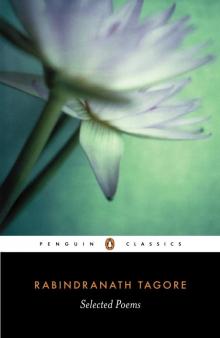 Selected Poems
Selected Poems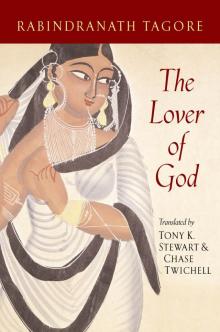 The Lover of God
The Lover of God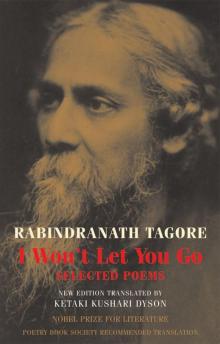 I Won't Let You Go: Selected Poems
I Won't Let You Go: Selected Poems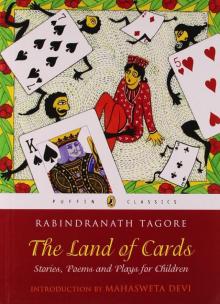 The Land of Cards: Stories, Poems, and Plays for Children
The Land of Cards: Stories, Poems, and Plays for Children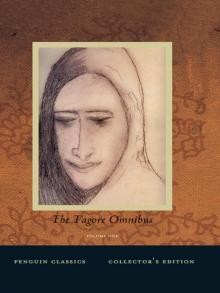 The Tagore Omnibus, Volume One
The Tagore Omnibus, Volume One The Boat-wreck
The Boat-wreck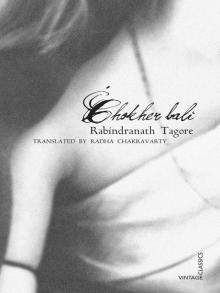 Chokher Bali
Chokher Bali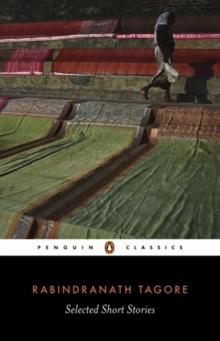 Selected Short Stories
Selected Short Stories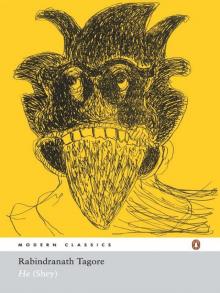 He (Shey)
He (Shey)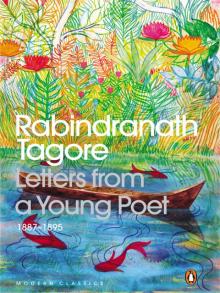 Letters From a Young Poet 1887 1895
Letters From a Young Poet 1887 1895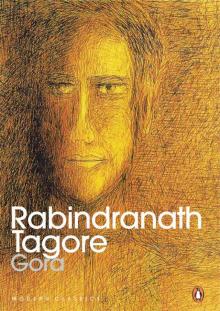 Gora
Gora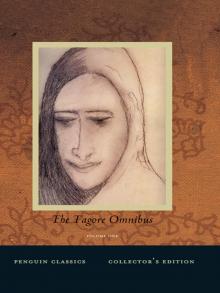 Tagore Omnibus, Volume 1
Tagore Omnibus, Volume 1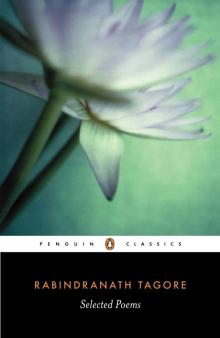 Selected Poems (Tagore, Rabindranath)
Selected Poems (Tagore, Rabindranath)